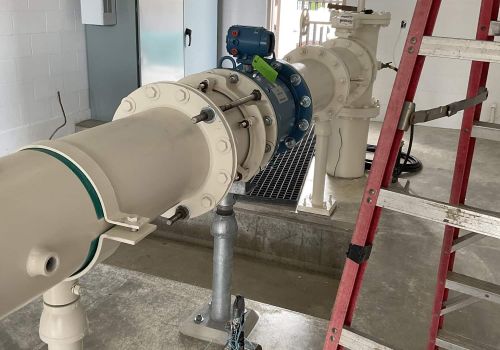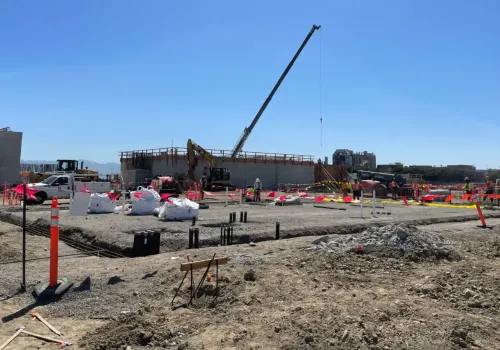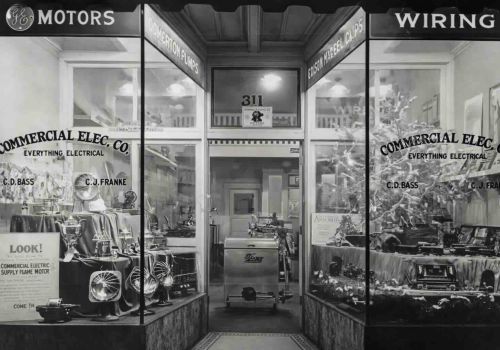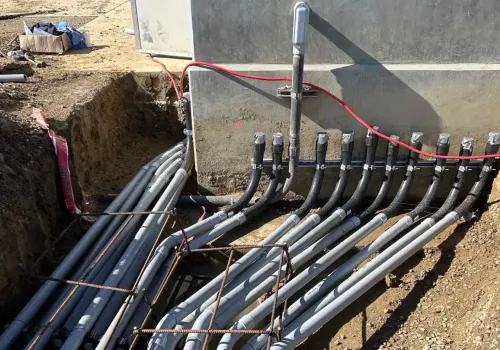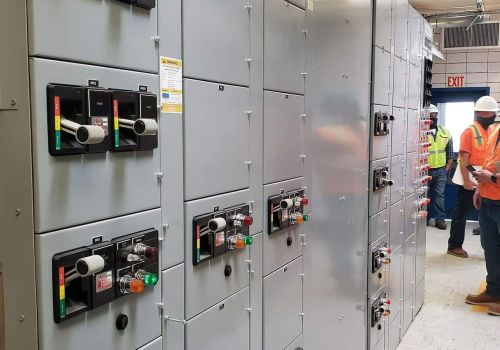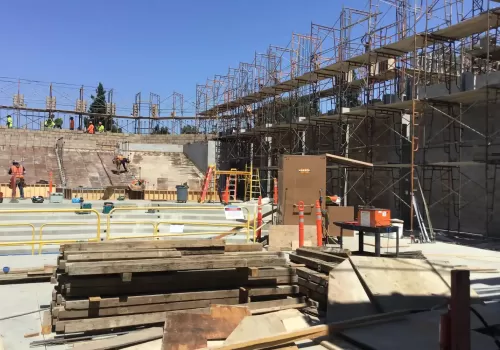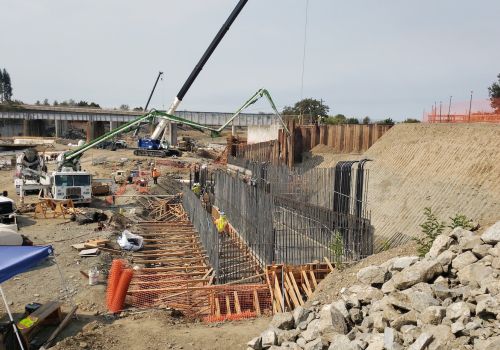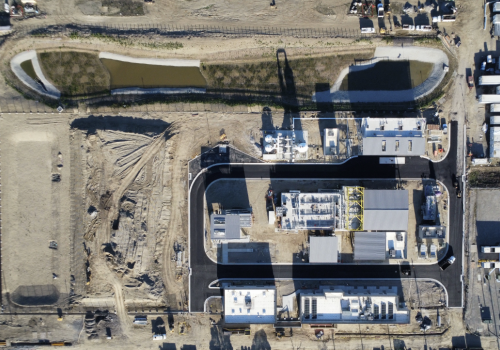What is it like to be an electrical project manager?
Commercial electrical construction project managers (PMs) keep track of all components needed to complete a project. At Con J. Franke, a project manager is involved in a new commercial electrical project from the initial planning stages to its post-job closeout after the new facility opens.
Our electrical projects cover the entire gamut from electrical underground, through the walls and ceilings, the lights, the HVAC – all of it. And PMs manage the project budgets and timelines as well as team members and suppliers, ensuring that everyone is on track with their responsibilities.
A PM must be able to communicate effectively with everyone involved in the project, understand every detail of what's happening at every step along the way, and make sure that nothing falls through the cracks, while also keeping everyone motivated so they stay engaged in their work throughout each day or week on the project site.
Does it sound interesting? It’s a challenge, but if you have strong people skills – if you’re able to build and manage relationships – that’s the best foundation for a project manager to have. All other skills can be learned.
Description of the PM role
Teresa Moss describes her job as a project manager at Con J Franke as being much like an orchestra conductor’s role.
- You have a stage (project) that’s set (desired).
- Every musician (project stakeholder) is in place.
- Each person has their instruments (the resources and tools) in their hands.
- The conductor gets on the stage and raises the wand to get everyone focused; the PM is at the ready to lead, motivate, and help everyone accomplish the projects’ goals.
Each person involved in the electrical construction project has all the tools they need. They all know what they are supposed to do. It’s the project manager’s job to keep everyone on task by following up, encouraging, and managing relationships.
A glimpse into a day in the life of a PM
At Con J. Franke, the project manager has a 40-hour-per-week schedule. Teresa’s is 7AM-4PM Monday-Friday. On rare occasions there is a need to work after hours, but they are the exception, not the norm.
Looking at Teresa’s day, none are typical since there is always something new to be done, but she tackles tasks in a certain order each day that helps her succeed in her role.
- Read email to see what needs to be done, update tasks, evaluate milestone, determine what needs to be prioritized, and so on
- Set up the calendar for the day and understand how the team(s) need to be led
- Create and communicate the project plan for the day
- Handle the toughest item first to win the day; if you can handle the most difficult item first, you feel successful
- Manage the team. Motivate, if necessary, follow up on issues, revise plans/resources, find solutions to backordered materials, and so on
- Always corresponding and reviewing notes throughout the day – to include texts, phone calls, emails, Zooms, and Teams
- Financial reviews of labor hours, supply costs, time it’s taking for tasks, etc.
Some projects are a breeze, most have a level of stress at one time or another, but the project manager needs to know that the project will be successful in the end; that all challenges and obstacles will be dealt with and overcome.
Of her current projects, one is just wrapping up; another has delays, and the end date is now past 2024. The impact with supply chain issues from COVID is still impacting many industries, including ours. As a project manager, part of the role is to figure out a new distribution channel or work with the stakeholder to uncover a new solution that can work instead of the original plan.
Some key tasks of a project manager
Regular tasks or responsibilities that are always on a project manager’s plate include:
- Managing the project timeline
- Overseeing the budget
- Providing a clear vision of the project to all stakeholders
- Making sure all team members working effectively together
- Setting goals and objectives for yourself and your team members to reach, including timelines for completion
- Monitoring and evaluating projects as they progress toward completion, making changes, if necessary, to keep costs down or increase efficiency on-site (if applicable).
Traits of a good electrical construction project manager
If you’re an experienced electrician or foreman, you possess the hard skills needed for that role. You even already know how to negotiate to some level when you are troubleshooting a project or issue and need to get buy-in for resolution. You know how to project plan, because you are planning out the new site, determining the steps needed; you’re always able to figure out what order actions need to be taken in. You prioritize and organize your days to some degree while communicating, possibly delegating, and communicating with others to get a job completed.
It may come as a surprise to learn that if you a strong technical background, such as several years in electrical engineering, that may make a transition to a PM role difficult instead of easier because most of the PM job is communication rather than technical. If you deeply enjoy the technical part of an electrical construction project, the PM role may not have enough of that to keep you engaged. (We do have other opportunities for you though!)
If you're considering becoming an electrical project manager, it's worth evaluating your soft-skill level in a few areas.
- Communication skills: A strong communicator is key in this position because they will be working with clients and engineers daily. Being able-to communicate clearly and effectively will ensure everyone knows what's going on with the project, which will help avoid confusion during stressful situations.
- Being organized and detail-orientated: Project managers often must keep track of many different moving parts at once; they must know where everything is at all times so that they can make sure all deadlines are met.
- Teamwork skills: commercial electrical projects involve lots of people working together toward one goal, being able to work as a team member as well as lead and motivate others is crucial.
- Conflict resolution: at times, people can become irritated and being able to talk them down and offer them solutions is a key skill to also have in this position.
Building relationships is crucial to success as a PM
A project manager does not fulfill her or his role individually, it is a team effort where each player relies on each other. The project assistant (PA) keeps all tasks on track through great follow up on a daily and weekly basis. Inside the company, the team players include billing, purchasing, and accounting, among others.
As well as having relationships with the internal project management team members, an electrical construction project manager needs to build and maintain relationships with several others involved in each project inside and outside the company, such as:
- Company owner and Director of operations
- Clients/customers
- Architects
- Designers
- Electrical engineering team members
- Superintendent and Foremen in the field
- General contractors
Every person each has different needs, expectations, and requirements to be successful in their individual roles and the project manager needs to understand what motivates each stakeholder and learn how to effectively communicate with them.
At Con J. Franke, the project management team meets weekly with the owner and/or director of operations as well as the entire company.
Training needed to be an electrical construction project manager
PM skills, and any other that you may need for the PM role can be attained through the National Electrical Contractors Association (NECA) [https://www.necanet.org/].
Examples of offerings through NECA include:
- How to Write an RFI
- How to Resolve Conflict
- How to Read Specs
- Basic Estimating of Electrical Construction
- Project Closeout
- Customer Relations
Training topics cover: estimating, general business, project management, communication, National electric code, and human resources. Everything you need to be a successful PM is available.
Many of these trainings are offered virtually, too!
PMs are required to attain eight hours of NECA training every year.
If you’re interested in becoming an electrical construction project manager, there’s no need to wait
Electrical project managers often manage several projects at a time, ensuring that all work is completed on time and within budget. Of all skills needed to be successful in an electrical project manager role, effective communication with internal and external stakeholders, tops the list.
For PM Teresa Moss, it’s the end result of every new project that drives her. When she sees the first drawings of the new project, she envisions the new facility opening, people who will be enjoying the new facility, and the positive impact it will make in the community.
